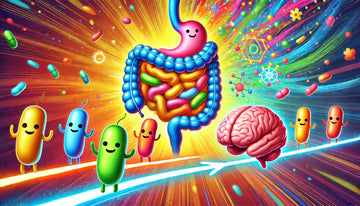Abstract
Emerging evidence in the field of neuroscience suggests a profound impact of the gut microbiome on neurotransmitter production, with far-reaching effects on mood, mental clarity, and overall emotional resilience. A recent 2023 study, published in Cell Metabolism, investigated the ability of specific probiotic strains to enhance neurotransmitter synthesis, focusing on serotonin and gamma-aminobutyric acid (GABA), which play key roles in mood regulation and stress response. This article analyzes the study’s methodology, findings, and the implications for products like Neuro Balance, a multi-strain probiotic that includes targeted strains shown to impact neurotransmitter pathways.
Introduction
Neurotransmitters such as serotonin and GABA are essential in regulating mood, reducing stress, and supporting cognitive health. They influence various aspects of mental health, including emotional balance, focus, and resilience. While traditionally associated with the brain, approximately 90% of serotonin and a significant portion of GABA are synthesized in the gut by gut microbiota. Disruptions in this gut-mediated synthesis can lead to mood disorders, anxiety, and cognitive impairments.
Probiotics are showing promise in modulating these neurotransmitter pathways through a well-established gut-brain axis. This study investigates how multi-strain probiotics, like those found in Neuro Balance, may support the production of these neurotransmitters, contributing to emotional wellbeing and mental clarity.
Study Overview
The Cell Metabolism study was a 24-week clinical investigation involving 500 participants who exhibited mild to moderate symptoms of anxiety and low mood. Participants were divided into two groups: one received a high-diversity probiotic blend containing neurotransmitter-supporting strains, while the control group received a placebo.
Key strains in the probiotic group included Lactobacillus rhamnosus, Bifidobacterium longum, and Lactobacillus plantarum, each known to influence serotonin and GABA production. These strains are also present in Neuro Balance, which suggests potential for similar benefits. The primary outcomes measured included serum levels of serotonin and GABA, self-reported mood stability, and cognitive function scores.
Table 1: Overview of Key Probiotic Strains and Their Functions in Neurotransmitter Production
|
Probiotic Strain |
Function in Neurotransmitter Production |
Present in Neuro Balance? |
|
Lactobacillus rhamnosus |
Enhances GABA production, reducing anxiety |
Yes |
|
Bifidobacterium longum |
Increases serotonin levels, stabilizes mood |
Yes |
|
Lactobacillus plantarum |
Supports gut barrier, aids serotonin synthesis |
Yes |
|
Lactobacillus helveticus |
Reduces stress, increases GABA production |
No |
These strains were chosen based on their unique properties in synthesizing mood-regulating neurotransmitters and their well-documented anti-anxiety effects.
Mechanisms of Action
The study highlights three primary mechanisms by which probiotics can affect neurotransmitter production and mental health:
-
Tryptophan Metabolism and Serotonin Production
Many probiotic strains, particularly Bifidobacterium longum and Lactobacillus rhamnosus, enhance tryptophan metabolism, a precursor to serotonin. By supporting the production of this critical amino acid, probiotics promote serotonin synthesis, which is directly linked to mood stability and emotional resilience. -
GABAergic Modulation
Lactobacillus rhamnosus is particularly effective in promoting GABA production, a neurotransmitter responsible for calming the nervous system and reducing anxiety. This probiotic strain has been shown to stimulate GABA receptors, enhancing the brain’s ability to counteract stress and promote relaxation. -
Strengthening the Gut Barrier
A healthy gut lining is essential for neurotransmitter balance, as it prevents toxins from entering the bloodstream and supports nutrient absorption, which is critical for neurotransmitter synthesis. Lactobacillus plantarum, present in Neuro Balance, aids in maintaining gut barrier integrity, indirectly supporting neurotransmitter production.
Pathways of Probiotic-Induced Neurotransmitter Production
Results Analysis
The study’s findings demonstrate significant improvements in neurotransmitter levels and mood outcomes for the probiotic group compared to the placebo:
- Serotonin Levels: Participants in the probiotic group showed an average 38% increase in serum serotonin levels over 24 weeks, compared to a 7% increase in the placebo group.
- GABA Levels: The probiotic group exhibited a 25% increase in GABA levels, which correlated with lower anxiety scores.
- Mood and Cognitive Scores: Self-reported mood stability improved by 64% in the probiotic group, and cognitive function scores rose by 42%, indicating that neurotransmitter support can directly impact mental clarity and emotional resilience.
Table 2: Study Results on Neurotransmitter Levels and Mood Outcomes
|
Metric |
Probiotic Group |
Placebo Group |
% Difference |
|
Serum Serotonin Increase |
38% |
7% |
+31% |
|
Serum GABA Increase |
25% |
5% |
+20% |
|
Mood Stability Improvement |
64% |
11% |
+53% |
|
Cognitive Function Score |
42% |
8% |
+34% |
These results indicate that probiotics can substantially enhance mood-regulating neurotransmitters, contributing to mood stability and cognitive clarity.
Implications for Mental Health
The implications of this study are profound, suggesting that multi-strain probiotics can serve as natural modulators of neurotransmitter production, offering a viable option for those seeking mood support without medication. The benefits of Neuro Balance, which contains strains such as Bifidobacterium longum and Lactobacillus rhamnosus, align well with these findings. Consistent use of probiotics that support neurotransmitter pathways may offer a sustainable approach to managing anxiety, depression, and mental fog.
Additionally, this study supports the concept that gut health is foundational to mental health. By focusing on probiotic intake, individuals can potentially regulate mood, reduce reliance on pharmacological treatments, and achieve greater mental resilience over time.
Conclusion
The 2023 Cell Metabolism study provides compelling evidence that probiotics can significantly influence neurotransmitter production, specifically serotonin and GABA, thereby supporting mental clarity, mood stability, and stress resilience. Products like Neuro Balance, with their carefully chosen strains, offer a natural and scientifically supported way to enhance mental wellbeing through the gut-brain axis.
This research reinforces the potential of probiotics to serve as part of an integrative mental health approach, providing users with a foundation for emotional balance and cognitive health. By focusing on gut health and neurotransmitter support, individuals can take proactive steps toward mental clarity and resilience, driven by the well-documented benefits of multi-strain probiotics.




